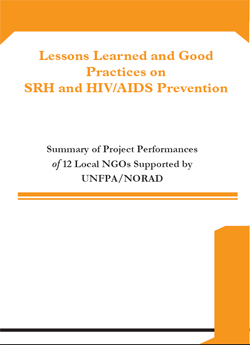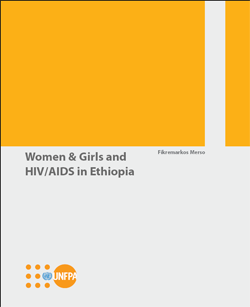The United Nations Population Fund (UNFPA)
The United Nations Population Fund (UNFPA) is an international development agency that promotes the right of every woman, man, and child to enjoy a life of health and equal opportunity. UNFPA supports countries in using population data for policies and programmes to reduce poverty and to ensure that every pregnancy is wanted, every birth is safe, every young person is free of HIV/AIDS, and every girl and woman is treated with dignity and respect. UNFPA is guided by the Programme of Action adopted by 179 governments at the International Conference on Population and Development (ICPD) in Cairo in 1994.
UNFPA began operations in Ethiopia in 1973. Working with both the Government of Ethiopia and civil society, UNFPA aims to improve the quality of life of the Ethiopian people by focusing on three main thematic areas: reproductive health, population and development, and gender. The Fund has assisted Ethiopia through five country programmes, and its current programme, the sixth, will extend from 2007 to 2011.
The Sixth Country Programme is aligned with the Government of Ethiopia’s (GoE) Plan for Accelerated and Sustained Development to End Poverty (PASDEP), the UNDAF, the MDGs, the ICPD Programme of Action, the Maputo Declaration, and the global UNFPA Multi-Year Funding Framework (MYFF)
The AIDS epidemic is a global catastrophe responsible for over 20 million deaths worldwide, tens of millions of children left orphaned, and some 33 million people living with HIV. Although global HIV prevalence has levelled off, AIDS is among the leading causes of death globally and remains the primary cause of death in Africa.
As one of ten co-sponsors of UNAIDS, UNFPA works to intensify and scale up HIV prevention efforts using rights-based and evidence-informed strategies, including attention to the gender inequalities that add fuel to the epidemic.
Within UNAIDS, the Fund takes a leadership role in HIV prevention, including condom programming and prevention among young people and women, two groups that are increasingly at risk of infection. It also reaches out to other vulnerable populations. Linking HIV responses with sexual and reproductive health care is the overarching strategy for reaching more people cost-effectively and moving towards the goal of universal access to prevention, treatment, care, and support by 2010.
HIV prevention
UNFPA is an advocate for and supports comprehensive and appropriate sexual health education as well as information and education services that clearly explain how sexual transmission of HIV can be averted. Other core HIV-prevention areas of activity for UNFPA include:
- Linking HIV/AIDS with sexual and reproductive health care
- Preventing HIV among young people
- Protecting the sexual and reproductive health of women and girls generally. This includes voluntary testing and counselling in reproductive health care settings, support for women living with HIV, and reducing the risks of mother-to-child transmission of HIV
- Preventing the sexual transmission of HIV, especially through condom programming.
- UNFPA is also committed to the human rights of people living with HIV and works to widen their access to sexual and reproductive health care that meets their specific needs.

“The Fight Against Early Marriage,” short film including descriptions of Berhane Hewan (“Light for Eve”), an early marriage intervention, and the 2008 “Stop Early Marriage” Campaign.
Maternal health
A second, no less critical global health issue is the state of maternal health. Maternal health is central to the achievement of all the Millennium Development Goals. Children whose mothers die are 3 to 10 more times more likely to die prematurely and significantly less likely to go to school than children who haven’t lost their mothers. The death or disability of a mother can drive a family into poverty; and the fact that every minute a woman dies in childbirth reflects deep gender and financial inequality. For every woman who dies, 20 or more experience serious complications, ranging from chronic infections to disabling injuries such as obstetric fistula.
In Ethiopia, maternal health is a national health issue that needs particular attention. The 2005 Demographic and Health Survey showed a maternal mortality ratio of 673/100,000 live births—one of the highest in sub-Saharan Africa. Skilled birth attendance occurs for only 6% of deliveries. Over 80% of maternal deaths in the country occur due to pregnancy-related complications that are attributed to limited and inadequate skilled staff; limited equipment, supplies and drugs; and inefficient health referral systems. This situation is compounded by some indirect causes of maternal death, including malaria, anemia, and HIV/AIDS.
Comprehensive reproductive health for all
UNFPA Ethiopia’s approach to ensuring comprehensive reproductive health for all is a holistic one. HIV/AIDS and maternal health activities – essential aspects of the Country Programme – support and are supported by UNFPA’s work in gender, population and development, humanitarian assistance, and reproductive health commodity security. For instance, UNFPA makes reproductive health education a key component of women’s empowerment programmes. It also addresses some of the root causes of maternal death, including early marriage and harmful traditional practices like female genital mutilation/cutting (FGM/C). In developing countries, women continue to die because they lack access to contraception. It is estimated that one in three deaths related to pregnancy and childbirth could be avoided if all women had access to contraceptive services. Maternal mortality rates are particularly high for young and poor women, those who have least access to contraceptive services. Therefore, Reproductive Health Commodity Security (RHCS) is an integral component of the Fund’s work to enhance maternal health.
The Country Office uses several strategies to support the Government of Ethiopia in strengthening health systems to stop the spread of HIV/AIDS and to ensure that women do not die giving life. First, the Fund offers support to ‘macro’ programmes: it is a signatory to the International Health Partnership + (IHP+) Compact, secures family-planning commodities through the Protection of Basic Services (PBS) II Fund, is a participating member of the Global Programme to promote RHCS, works to reposition family planning as critical to reducing maternal mortality, and participated in the GoE’s 9th Health Sector Development Programme (HSDP III) Midterm Review.
Second, the Fund supports national systems strengthening. It has initiated, with the Ministries of Health and Education, a 3-year Masters of Science programme on Integrated Emergency Obstetric Care and Surgery in 4 universities. UNFPA has conducted a national baseline assessment of emergency obstetric and newborn care, and, working with the GoE, the Country Office is intensifying support to midwifery and anesthesia training schools and helping to strengthen the Health Sector Financial System (and Health Management Information System [HMIS]). It is a partner in the Development Assistance Group (DAG), Technical Working Groups TWGs and donor/technical taskforces.
Learn more about funding for specific UNFPA programs
Learn more about UNFPA Ethiopia’s Goals and Objectives
Learn more about UNFPA’s Achievements and Impact
Learn more about UNFPA’s Peer Recognition

- United Nations Population Fund
- P.O. Box 5580
- Addis Ababa, Ethiopia
- Tel: +251-11-551 19 80
- E-mail: ethiopia.office@unfpa.org
- http://www.unfpa.org


